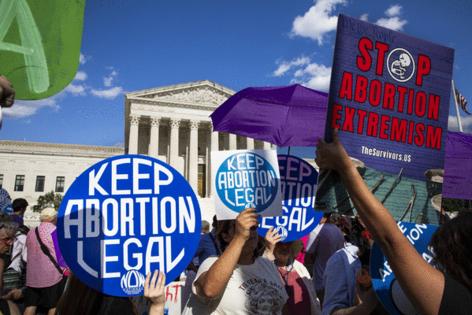Supreme Court to hear case over Planned Parenthood Medicaid funding
Published in Political News
WASHINGTON — The Supreme Court on Wednesday agreed to hear a dispute over South Carolina’s effort to keep Planned Parenthood facilities from receiving Medicaid funding, the latest step in the state’s yearslong battle to defund the provider because it offers abortion care.
The case, known as Kerr v. Edwards, could determine states’ ability to deny funding to Medicaid providers over issues such as abortion. The justices agreed in Wednesday’s unsigned order to hear one portion of the dispute: whether the Medicaid law establishes a federal right for beneficiaries to receive care at the qualified provider of their choice regardless of a state policy decision.
South Carolina argued that Congress never meant to create an individual federal right to a choice of a Medicaid provider and urged the justices to overturn a decision by the U.S. Court of Appeals for the 4th Circuit keeping Planned Parenthood in the program.
The justices will likely hear arguments and issue a decision before the end of the court’s term in June.
The fight dates back to 2018, when the state’s governor sought to exclude abortion providers from receiving Medicaid family planning funding as part of Medicaid’s federal-state shared structure, saying that any funds to Planned Parenthood and other clinics helped subsidize abortion care.
Planned Parenthood sued, arguing that the federal program includes language that “any qualified provider” is eligible to provide services and receive Medicaid funding, regardless of a state determination about the program.
Following a district court ruling against the state, the case bounced between the trial court, the Supreme Court and U.S. Court of Appeals for the 4th Circuit for years. In 2023, the Supreme Court vacated a 4th Circuit ruling that kept the state locked into a funding agreement with Planned Parenthood as a result of an unrelated case about a similar right in mental health care.
The 4th Circuit eventually ruled again, affirming its original decision that Planned Parenthood had a right under federal law to sue for Medicaid funding.
“We refuse to nullify Congress’s undeniable desire to extend a choice of medical providers to the less fortunate among us, individuals who experience the same medical problems as the more fortunate in society but who lack under their own means the same freedom to choose their healthcare provider,” the appellate judges ruled.
In its brief opposing the return of the case to the Supreme Court, Planned Parenthood argued that the Medicaid law was meant to provide an individual right to their choice of provider from anyone that meets the legal requirements.
States have sought to strip funding from Planned Parenthood and other providers for “unwarranted and politically motivated” reasons — rather than the providers’ ability to provide qualified care, the organization argued.
“Congress enacted this provision to ensure that Medicaid recipients, like other individuals, could make deeply personal choices about where to obtain medical care without states ‘restricting beneficiaries to certain providers,’” Planned Parenthood argued.
The case could impact Planned Parenthood’s access to funding beyond South Carolina as well. States such as Arkansas, Missouri, Mississippi and Texas have laws restricting funding for Medicaid services, according to court papers.
The justices only agreed to hear one portion of the case, as requested by Planned Parenthood, and did not agree to hear whether there is a federal right to obtain care from a provider a state has determined is unqualified.
Conservative legal organizations and members of Congress have urged the justices to rule in South Carolina’s favor. Nine Republican senators and more than 50 Republican House members signed onto a brief in July urging the justices to take the case.
The group argued that allowing spending legislation, like the Medicaid law, which involves cooperation between the federal government and the states, to override a state determination would risk “commandeering” states’ ability to make their own policy decisions.
The group’s brief also argued that allowing the 4th Circuit decision to stand could increase litigation over access to funding and increase Medicaid costs. The Centers for Medicare & Medicaid Services put combined federal and state Medicaid spending at $805.7 billion in calendar year 2022.
“These increased costs will stifle the flexibility Congress provided states to innovate in their Medicaid programs,” the brief said.
_____
©2024 CQ-Roll Call, Inc., All Rights Reserved. Visit cqrollcall.com. Distributed by Tribune Content Agency, LLC.




























































Comments